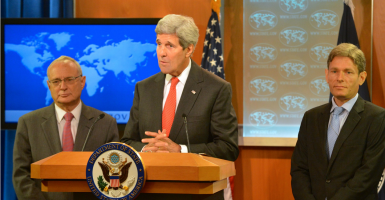Secretary of State John Kerry and Assistant Secretary at the Bureau of Democracy, Human Rights, and Labor Tom Malinowski presided over the release of the U.S. Department of State’s 40th annual Human Rights Report. The report reviews the state of human rights in nearly all countries across the world.
This year, Kerry placed special emphasis on the plight of individuals in the Middle East. As a component of his remarks Malinowski highlighted the connection between terrorism and human rights abuse. It is well known, for example, that the Islamic State of Iraq and Syria (ISIS) uses slavery and rape to oppress Yazidi women and girls and solidify their ruthless rule.
However, the State Department went a step further, claiming that human rights abuses spawn terrorism. In his recent remarks, Malinowski noted:
In Syria, we see how human rights abuses in one small country can have consequences far beyond that small country’s borders—from a refugee exodus that is altering the politics of Europe to the spawning of a terrorist group that threatens us all.
Drawing this direct connection between human rights abuses in Syria and the creation of ISIS seems implausible at best. If we applied the same logic to other rights abusing regimes, North Korea and China would have more terrorist groups than the vast majority of other countries.
But this is clearly not the case.
Malinowski and Kerry seem to put the cart before the horse. Brutal terrorists do carry out unthinkable abuses, like the genocide committed by ISIS. But the rise of terrorist cells are not the inescapable consequence of widespread human rights abuses.
Combatting human rights abuses should be viewed as a key component of U.S. national security strategy—but it only serves to undermine the case for connecting the two when government officials mischaracterize the connection between human rights and security issues.
The State Department should focus its efforts on highlighting known human rights abuses to legitimize meaningful U.S. action toward combating human rights abuses. This means going beyond designations and reports, and taking tangible and consistent action to address rights violations perpetrated by known human rights abusers around the world.
































